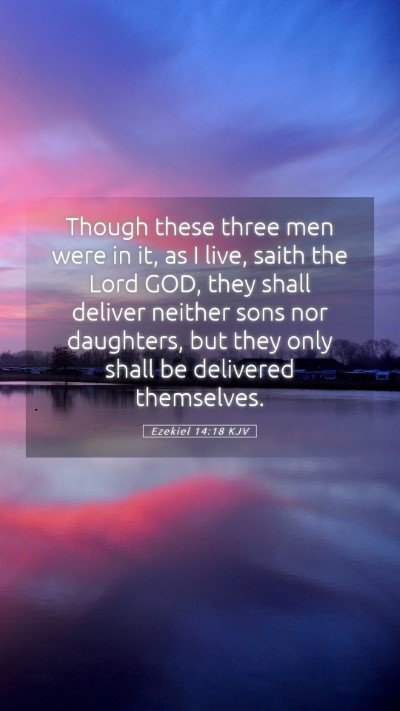Bible Verse Commentary on Ezekiel 14:18
Verse: "Though these three men, Noah, Daniel, and Job, were in it, they should deliver but their own souls by their righteousness, saith the Lord GOD." (Ezekiel 14:18)
Understanding the Context
Ezekiel 14 addresses the dire situation of the people of Israel, who are in exile due to their idolatry and sin. The passage explores the concept of individual responsibility, suggesting that even the righteousness of the most virtuous individuals cannot save an entire society from judgment. This underscores the biblical theme that each person must have their own relationship with God.
Bible Verse Meanings and Insights
-
Historical Significance: Both Matthew Henry and Albert Barnes emphasize the historical context of the chosen figures—Noah, Daniel, and Job—who symbolize righteousness and faithfulness in times of distress and adversity. Their individual examples serve as a testament that personal righteousness is paramount, especially during collective judgment.
-
Spiritual Application: Adam Clarke notes that this verse serves as a severe warning. It indicates that during God's judgment, no amount of intercession or collective righteousness can deliver individuals who do not themselves seek righteousness. This statement serves to encourage personal piety over reliance on communal faith.
-
Personal Responsibility: The emphasis on “deliver but their own souls” highlights the biblical principle that faith is personal. The faith of others—no matter how great their righteousness—cannot substitute for one's personal commitment to God.
-
Comparison of the Righteous: The specific mention of Noah, Daniel, and Job illustrates different facets of righteousness: Noah's faith amidst a corrupt world, Daniel's steadfastness in a foreign land, and Job’s endurance through suffering. This teaches that righteousness is manifested in various life situations.
-
Divine Sovereignty: The phrase “saith the Lord GOD” emphasizes that it is God who establishes the terms of deliverance. His sovereignty means that He discerns the hearts of individuals, and His judgment is just and righteous.
Commentary from Public Domain Scholars
Matthew Henry provides a detailed exploration of the implications of this verse, highlighting that no one can escape God's judgment without their own righteousness. He posits that the righteousness of the faithful few, although commendable, cannot shield the ungodly from the consequences of their actions.
Albert Barnes elaborates further on the specific cases of Noah, Daniel, and Job, underscoring their exemplary faith and the promise of God that each will be individually accountable. He articulates that this verse denotes both warning and hope—warning of judgment, but hope through personal righteousness.
Adam Clarke draws attention to the significance of the names mentioned in the verse as representatives of profound faith, suggesting that their righteousness afforded them personal salvation but could not extend to others. Each figure experienced distinct trials but remained steadfast, thus offering a narrative of hope and resilience.
Relevance and Application in Daily Life
This verse is particularly relevant for believers today as it challenges them to prioritize their individual relationship with God above cultural or communal identity. It serves as a reminder for self-examination: each person is accountable for their own faith and conduct.
Cross References for Further Study
- Genesis 6:9-22 - The story of Noah and his righteousness.
- Daniel 6 - The faithfulness of Daniel in the face of persecution.
- Job 1:1-3 - Job's integrity and suffering.
- Proverbs 11:4 - The concept of righteousness in influencing one's outcome.
- Ezekiel 18:30 - Individual responsibility in righteousness.
Conclusion
In conclusion, Ezekiel 14:18 serves as a profound reminder of the personal nature of faith and righteousness. Understanding this verse involves a mixture of historical context and modern application, speaking to both the individual's relationship with God and the implications of collective sin. It prompts believers to reflect on their faith and encourages personal accountability in their spiritual journeys.
For anyone seeking bible verse meanings, bible verse interpretations, and insights for bible study groups, this verse encourages deep reflection on personal faith and its implications in the broader community.


